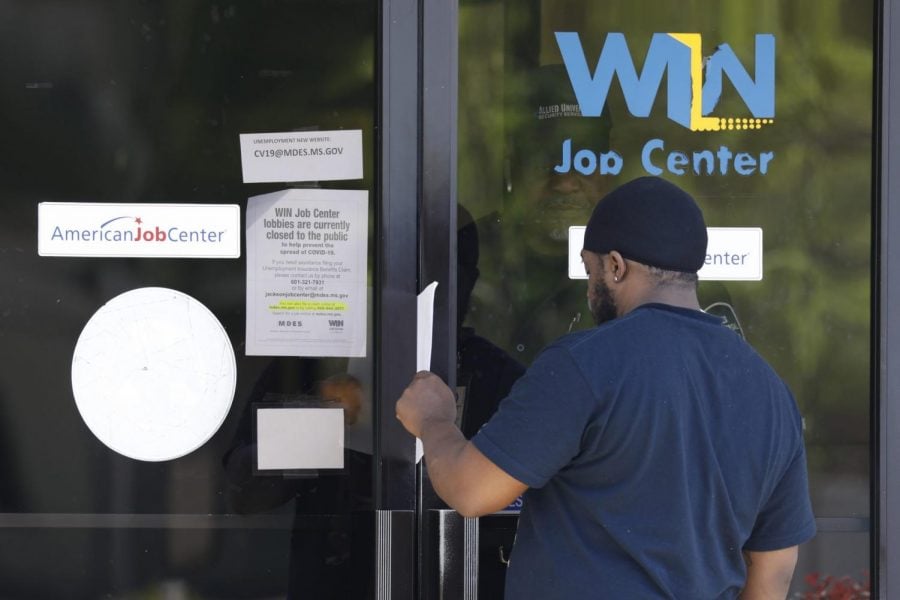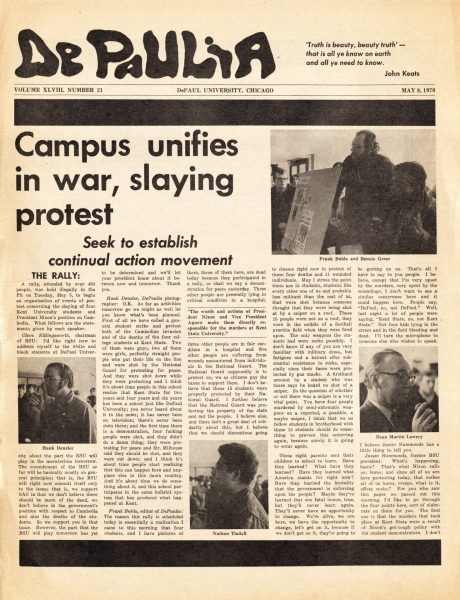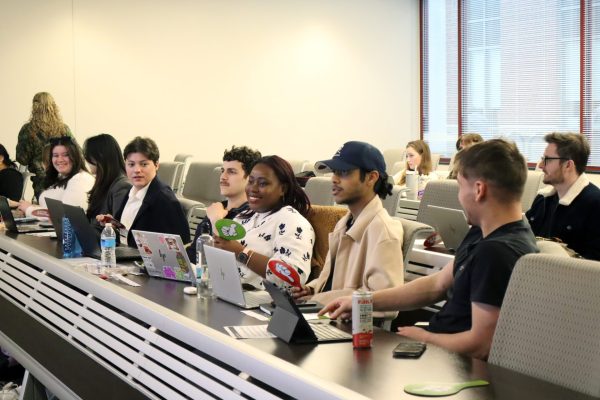Graduating seniors prepare to face an uncertain job market
Tyrone Keoton Jr., is handed an unemployment benefit application form by a security guard behind the glass doors of this state WIN Job Center in north Jackson, Miss., Thursday, April 2, 2020. The job centers lobbies are closed statewide to prevent the spread of COVID-19. The agency encourages residents to apply for their benefits on line, however, the system has been stressed by the large numbers of applicants. The local job centers are making paper unemployment applications available and applicants are filling them out and pushing them back through the mail slots or doors as well as they can.
Senior year of college is an undoubtedly emotional time filled with highs and lows all leading to a similar road: graduating from school and trying to figure out your next move.
For many students, the next move is attempting to find a job, hoping that their degree will land them something aligned with their professional interests and a decent paycheck.
For the Class of 2020, however, entering the job market is just one of the many aspects of day-to-day life that COVID-19 has turned on its head.
With the pandemic causing mass layoffs and furloughs and the economy approaching a sharp downturn, the already stressful prospect of entering the job market now has an added pressure.
“It’s been a little stressful just because, I mean, there’s not real money in the few places that are hiring,” said Connor Altier, a sociology major who graduated in the Winter Quarter. “There’s just not enough jobs with them to go around, because so many people have to find jobs now.”
The pandemic has left over 1 million Illinois residents out of work, with the state’s overall employment rate dropping under 50 percent — a lower percentage than was found during the Great Recession.
“When this event has passed it will go down as the worst economic collapse in the U.S. since the Great Depression of the 1930s,” said Michael Miller, an associate professor of economics at DePaul. “The rise in unemployment and the fall in payroll jobs and GDP will dwarf every recession since the ‘30s.”
The unstable economy presents an uncertain future for the graduating class, with some students considering pursuing a graduate degree to help bolster career aspirations.
“It is common that students who have such dismal markets for jobs will stay in school a little longer so they can come into a better market with more credentials,” Miller said.
Ivana Mladenovic, a psychology major at DePaul, was pursuing two post-graduate options: applying to graduate school or applying for data analyst positions in the city. After the pandemic worsened, however, one option became far more viable than the other.
“Now, honestly, I’m more going towards furthering my education route into grad school because the job market right now is pretty bad,” Mladenovic said. “It’s really, really hard for just-out-of-college graduates to get jobs at the moment.”
Mladenovic said that, if she chooses to attend graduate school, she is interested in pursuing a degree in counseling psychology, in order to work as a social worker or therapist.
For those who are not attempting to pursue a graduate degree, they now face the challenge of entering a job market amid a global pandemic and a receding economy.
Andrew Kamath, a marketing major with a concentration in sales leadership at DePaul, had previous internship experience with a start-up that he was hoping to join after graduation. His dream job involved merging his degree concentrations in a leadership position.
“I love marketing, but I think I primarily want to work in the sales leadership aspect of my degree,” he said. “Ideally, I’d like to become an executive as part of some leadership team at a company with a vision I really care about.”
However, the pandemic hit the company hard, leading to mass layoffs.
“Unfortunately, the company is involved with the restaurant industry, so it laid off like half of their workforce,” Kamath said. “They’re a startup, so they have to be very risk-averse, so that kind of was shot down.”
Kamath remarked that he is primarily concerned with being able to grow within his chosen industry and is worried about finding a career that he is passionate about.
“I am concerned about career growth,” he said. “I’m concerned about finding a job that I really am passionate about. You know, I feel like I’m going to have to compromise and take something that I’m not very interested in.”
When asked about pursuing a graduate degree, Kamath remarked that the possibility of pursuing a degree digitally was a major detractor.
“Grad school was never really in the plans initially, and I like to be in the classroom when I’m learning,” Kamath said. “So [online learning] is not something that, you know, entices me to go back.”
Despite the fears surrounding entering the job market amid a global pandemic, students have remarked they have been given access to helpful job-searching resources while at DePaul.
“I think that there’s a lot of resources on campus, like the Career Center and other things like that, that definitely help students, you know, further their career and get jobs out of college,” Mladenovic said.
While entering the job market may appear to be a daunting task, hope has not run out for the Class of 2020.
“I think if I get a job at a company that has good vision and it felt secure in this pandemic, I’d be optimistic,” Kamath said.












